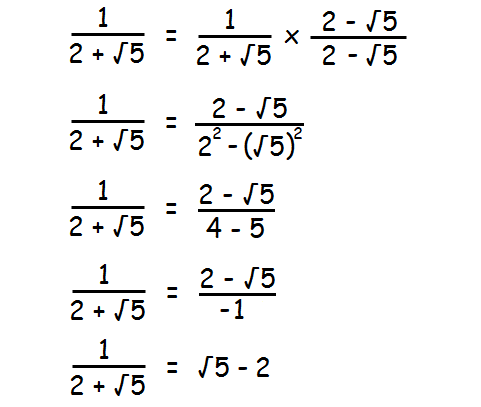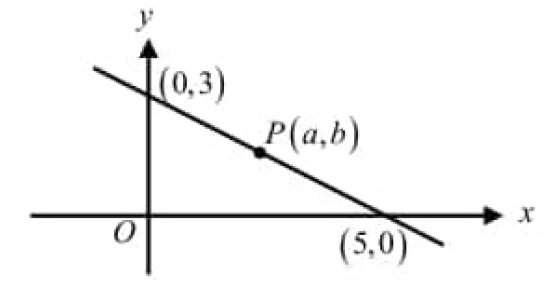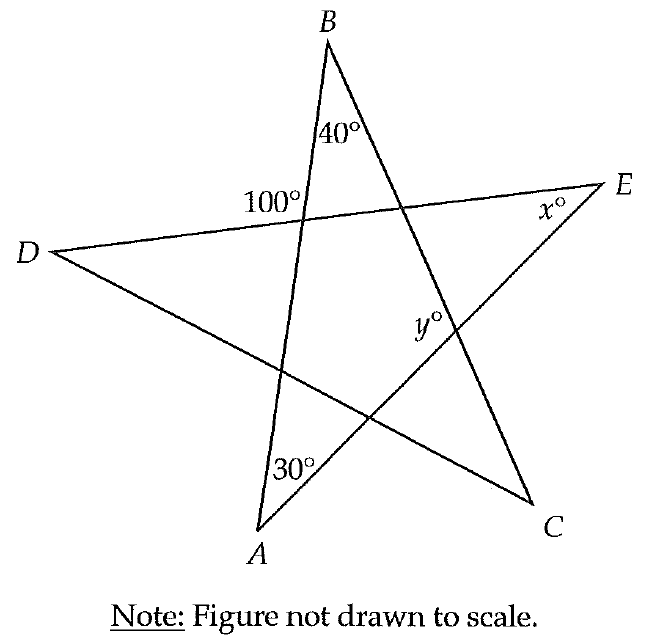SIMPLIFYING RADICAL EXPRESSIONS WITH CONJUGATES WORKSHEET
Problem 1 :
Simplify :
1 / (2 + √5)
Problem 2 :
Simplify :
(6 + √5) / (6 - √5)
Problem 3 :
Simplify :
1 / (8 - 2√5)
Problem 4 :
Simplify :
2 / √3
Problem 5 :
Simplify :
1/√2 + 1/√5

Detailed Answer Key
Problem 1 :
Simplify :
1 / (2 + √5)
Solution :
Simplifying the above radical expression is nothing but rationalizing the denominator.
So, rationalize the denominator.
Here, the denominator is 2 + √5.
In the given fraction, multiply both numerator and denominator by the conjugate of 2 + √5. That is 2 - √5.

Problem 2 :
Simplify :
(6 + √5) / (6 - √5)
Solution :
Simplifying the above radical expression is nothing but rationalizing the denominator.
So, rationalize the denominator.
Here, the denominator is 6 - √5.
In the given fraction, multiply both numerator and denominator by the conjugate of 6 - √5. That is 6 + √5.
(6 + √5) / (6 - √5) = [(6+√5)(6+√5)] / [(6-√5)(6+√5)]
(6 + √5) / (6 - √5) = [(6+√5)(6+√5)] / [(6-√5)(6+√5)]
(6 + √5) / (6 - √5) = (6 + √5)2 / [62 - (√5)2]
(6 + √5) / (6 - √5) = [62 + 2(6)(√5) + (√5)2] / (36 - 5)
(6 + √5) / (6 - √5) = [36 + 12√5 + 5] / 31
(6 + √5) / (6 - √5) = (41 + 12√5) / 31
Problem 3 :
Simplify :
1 / (8 - 2√5)
Solution :
Simplifying the above radical expression is nothing but rationalizing the denominator.
So, rationalize the denominator.
Here, the denominator is 8 - 2√5.
In the given fraction, multiply both numerator and denominator by the conjugate of 8 - 2√5. That is 8 + 2√5.
1 / (8 - 2√5) = 1(8+2√5) / [(8-2√5)(8+2√5)
1 / (8 - 2√5) = (8 + 2√5) / [82 - (2√5)2]
1 / (8 - 2√5) = (8 + 2√5) / [64 - (4 ⋅ 5]
1 / (8 - 2√5) = (8 + 2√5) / [64 - 20]
1 / (8 - 2√5) = (8 + 2√5) / 44
1 / (8 - 2√5) = 2(4 + √5) / 44
1 / (8 - 2√5) = (4 + √5) / 22
Problem 4 :
Simplify :
2 / √3
Solution :
Simplifying the above radical expression is nothing but rationalizing the denominator.
So, rationalize the denominator.
Here, the denominator is √3.
In the given fraction, multiply both numerator and denominator by √3.
2 / √3 = (2√3) / (√3 ⋅ √3)
2 / √3 = 2√3 / 3
Problem 5 :
Simplify :
1/√2 + 1/√5
Solution :
To add the above two fractions, make the denominators same.
Least common multiple of √2 and √5 is
= √2 ⋅ √5
= √(2 ⋅ 5)
= √10
Then,
1/√2 + 1/√5 = √5/√10 + √2/√10
1/√2 + 1/√5 = (√5 + √2) / √10
To rationalize the denominator on the right side, multiply both numerator and denominator by √10.
1/√2 + 1/√5 = [(√5+√2)√10] / (√10 ⋅ √10)
1/√2 + 1/√5 = (√50 + √20) / 10
1/√2 + 1/√5 = (√(5 ⋅ 5 ⋅ 2) + √2 ⋅2 ⋅ 5) / 10
1/√2 + 1/√5 = (5√5 + 2√5) / 10
Kindly mail your feedback to v4formath@gmail.com
We always appreciate your feedback.
©All rights reserved. onlinemath4all.com
Recent Articles
-
Digital SAT Math Problems and Solutions (Part - 134)
Apr 02, 25 12:40 AM
Digital SAT Math Problems and Solutions (Part - 134) -
SAT Math Resources (Videos, Concepts, Worksheets and More)
Apr 02, 25 12:35 AM
SAT Math Resources (Videos, Concepts, Worksheets and More) -
Digital SAT Math Problems and Solutions (Part 135)
Apr 02, 25 12:32 AM
Digital SAT Math Problems and Solutions (Part 135)

